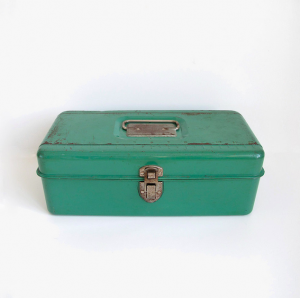by Kim Keller
Today In Care of Dad publishes its 101st blog!
It’s quite a milestone for us. To celebrate this landmark occasion, we’re taking a look back at some of the most useful tools and resources we’ve written about here at In Care of Dad, items that have helped many people — just like you and me and my sister — to care for our aging parents.
Here are some of our favorite finds:
CaringBridge.org — This wonderful service helps friends and families sharing a health crisis by offering space and access to any group, extended or otherwise, that wants to stay abreast of a loved one’s health status. But more than that, Caringbridge helps families arrange their websites with the following format features: 1) journal entries to keep everyone up-to-date; 2) photo uploads to provide a visual component; and 3) a private message center where family and friends can deliver words of encouragement and support. This service is easy to use and completely free!
At The Crossroads: Family Conversations about Alzheimer’s Disease, Dementia and Driving, from The Hartford — This guidebook, as well as other safety information for older drivers, can be found on The Hartford website, and it is recommended that families read and discuss this book soon after a diagnosis of dementia. The guidebook offers suggestions on how to have a good conversation with your family about driving issues. It also lists warning signs for drivers with dementia, and helps you explore alternative transportation options.
MedTime Automatic Pill Dispensers from e-pill.com — There are many different dispensers to choose from, but the one we featured has 28 compartment for pills and the like, so it can handle a variety of medication routines without the need for constant refilling. The dispenser also has an easy-to-use timer system that’s adjustable for each routine.
Once the dispenser is properly filled, and the timer is set, then it can be locked for safety. When it’s time for a medication to be taken, the dispenser opens to the next proper dosage compartment and a loud alarm goes off, accompanied by blinking lights. Both alerts stay on for up to 60 minutes — or until the medication is dispensed. If for some reason the medication is not removed, then the compartment will close and the dispenser slides over to the next dosage. This allows a caregiver to keep track of any deviations from the medication routine. Missed dosages should naturally be reported to the appropriate doctor.
Medicare Coverage Database — We found a terrific resource on the Medicare website that will quickly tell you what costs Medicare will cover and what costs it won’t. You’ll receive guidelines outlining the requirements for coverage, such as whether a doctor needs to approve the treatment, what percentage of the bill you’ll be responsible for, and who else you can contact for additional information. The database explains the coverage situation for items such as hearing aids and wheelchairs; for tests like mammograms and blood screenings; and for services like surgery and emergency room visits. It is a thorough database with easily accessible information.
Mediguard.org — A free and easy-to-use service that reviews the potentially dangerous interaction of prescription drugs that your parent or loved one may be currently taking. I was curious about this site so I decided to sign my mom up. I provided a list of her medications (prescriptions, over-the-counter drugs, vitamins and herbs), along with other required information like her gender, age and zip code, and within a few minutes I received back an informative and easy-to-read report, the purpose of which is to alert the reader to any potential problems with drug interactions. But the report goes even further: it ranks the severity of the risk, notes the side effects for each medication, and points out the possibility of counterproductive interactions — when one prescription might be making another less effective.
We’re proud of the work we’ve done at In Care of Dad, and we’re eager to share more great tools with you in the coming months. If you have any resources that we’ve somehow overlooked, please send them along to us and we promise to share them with all the other readers!
Kim Keller is the co-founder of In Care of Dad. She lives and works in New York City.
Thank you to Sue Schultz for donating the use of her beautiful tool box photo. To see more of her photography, check out her photostream.






